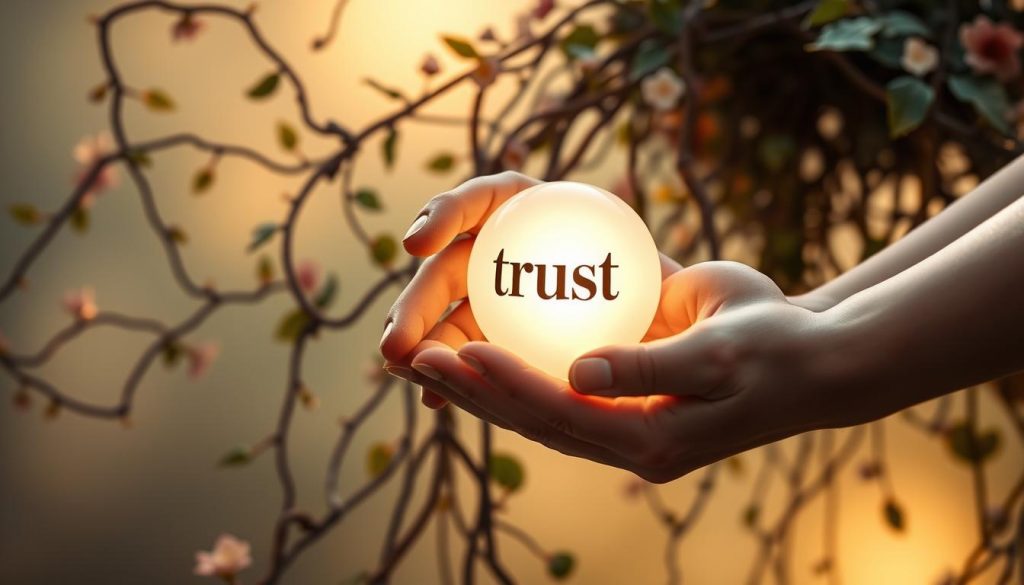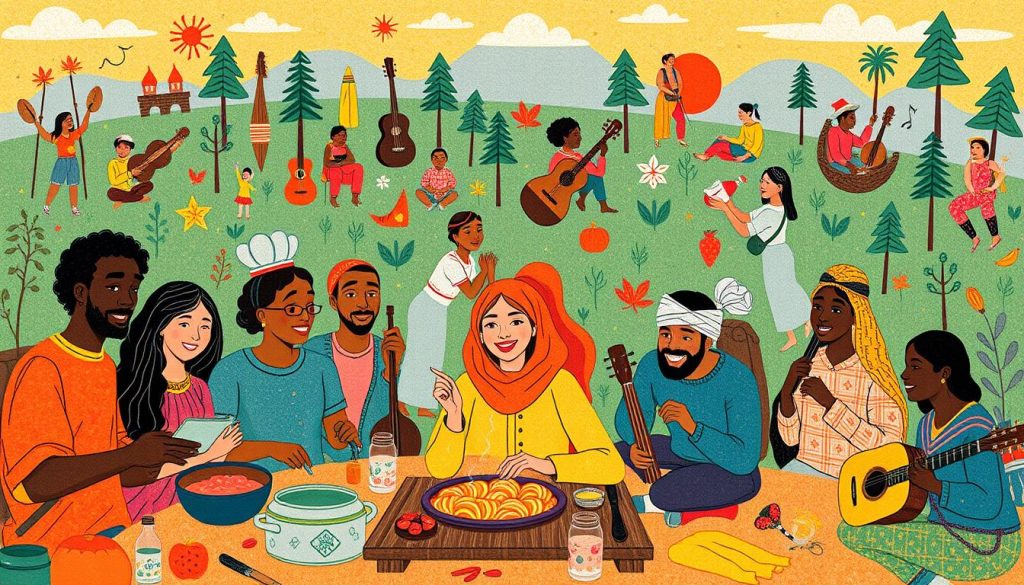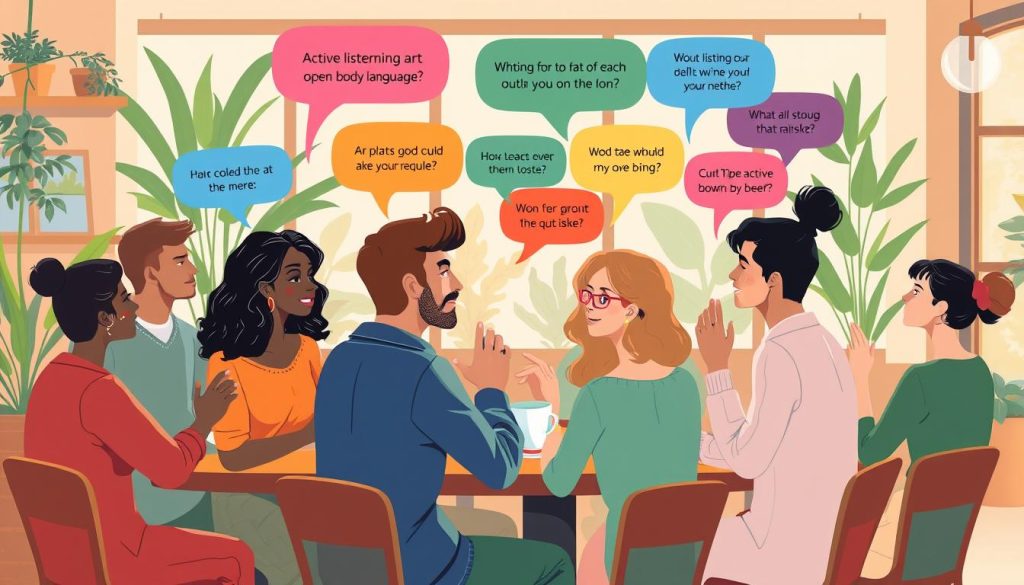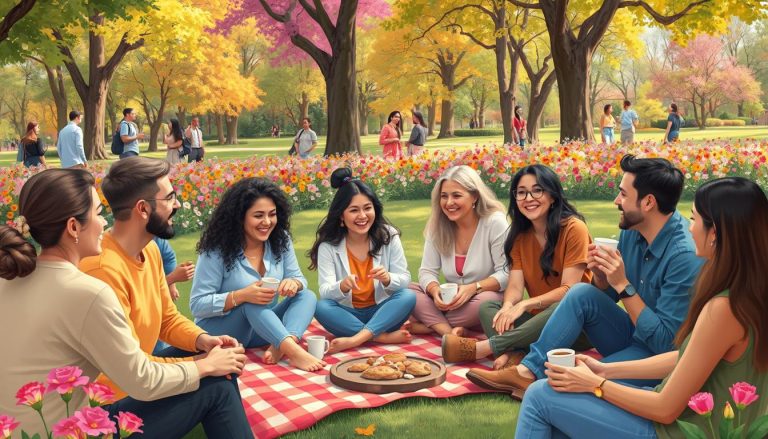Building Lasting Friendships: Tips for Deeper Connections
Friendships are the foundation of our lives, often bringing us more joy than other relationships. They make us feel complete, boost our empathy, and help us find who we truly are. Having close friends is crucial for aging well, and they also help society by building trust and reducing prejudice.
To create lasting Building Lasting Friendships, we need to put in effort, take the lead, and be open. People with a secure attachment style tend to have warmer, more supportive friendships. Starting to connect with others is key, as it’s necessary for Interpersonal Relationships to grow and flourish.
Being real is essential in Social Skills because it lets us be our true selves and stick to our values. Showing kindness, affection, and handling anger wisely can make our friendships deeper and more rewarding. Mutual support, loyalty, and solving conflicts openly are vital for keeping friendships strong and fulfilling over time.
Understanding the Importance of Friendship
Friendships are more than just casual connections. They are key to our emotional well-being and personal growth. These relationships give us a deep sense of belonging and support during tough times. They also help us grow emotionally and personally.
By being around people who understand and support us, we create a caring environment. This environment can greatly improve our mental health and overall happiness.
Benefits of Friendships for Mental Health
Research shows that strong social connections boost our mental health. Adults with close friends and good social support are less likely to suffer from depression, high blood pressure, and unhealthy weight. Older adults with close friendships also live longer than those with fewer friends.
Keeping these meaningful relationships can protect us from loneliness and isolation. Both can harm our well-being.
How Friendships Enhance Life Satisfaction
Friendships also improve our life satisfaction. Feeling a sense of belonging and having people who care about us boosts our purpose and fulfillment. Aristotle believed that great friendships are rare but have a huge impact on our lives.
The quality of our friendships matters more than how many friends we have. Aristotle said that great friendships are rare but have a huge impact on our lives.
“Having a friend who becomes obese makes an individual 57 percent more likely to become obese. Conversely, having a friend who quits smoking reduces the individual’s likelihood of starting smoking by 36 percent.”
Friendships have a powerful effect on our lives, not just our own well-being. Our friends’ behaviors can influence ours. This shows how important it is to have meaningful connections with people who share our values and support our growth.
The Foundations of Strong Relationships
At the heart of any meaningful relationship are effective communication and trust. These two elements are key to building strong friendships.
Communication: The Key to Connection
Effective communication is crucial for strong friendships. Showing genuine interest in your friends’ lives and listening well shows respect. Sharing your thoughts and feelings openly helps deepen connections.
Working together and feeling empowered together also strengthens these bonds.
Trust and Vulnerability: Building Blocks of Friendships
Trust is a fundamental element of any strong friendship. Being vulnerable can actually help build trust and intimacy. Sharing your true self and asking for help when needed shows courage.
It can lead to a deeper connection and understanding with your friends.
“Friendship is the highest form of love,” as the ancient Greeks and various Eastern philosophical traditions have long recognized. Emotional intelligence, empathy, and a genuine interest in each other’s lives are essential for sustaining deep friendships.
By focusing on communication strategies and building trust, you can create lasting friendships. These friendships will enrich your life for years to come.

Finding Common Interests
Shared interests and experiences are key in building strong friendships. Doing things together creates lasting memories and deepens your bond. Whether it’s trying a new hobby or enjoying a shared passion, these moments hold friendships together.
Hobbies and Activities to Explore Together
Discovering common interests opens up a world of shared experiences. Here are some ideas to get you started:
- Join a local club or class that matches your passions, like a book club or cooking class.
- Check out cultural events or exhibitions that interest you both, such as art galleries or music concerts.
- Plan joint travel adventures, whether a weekend trip or a longer vacation, to make memories.
- Try physical activities together, like hiking or team sports, to build camaraderie and social skills.
The Role of Shared Experiences in Bonding
Shared experiences are the base for deep, lasting friendships. Doing things together lets you learn more about each other and build trust. These shared experiences can be anything from everyday moments to exciting adventures, all helping to strengthen your connection.
“Discovering common ground with a friend is like finding a hidden treasure – it opens up a world of possibilities for shared experiences and deeper understanding.”
Investing time in finding and exploring shared interests can make your friendship stronger and more meaningful. The experiences you share will be the foundation of a lifelong bond.

Effective Communication Strategies
Good friendships need strong communication strategies. One key skill is active listening. This means giving your full attention, understanding the speaker, and responding well. It’s also about avoiding distractions, keeping eye contact, and using good body language.
Sharing your feelings is also key for deepening friendships. But, it’s vital to share with those you trust. Being open and honest can make your friendship stronger and more empathetic.
Listening: A Vital Skill in Friendships
Active listening is the base of good communication in friendships. It includes:
- Giving your full attention to the speaker
- Trying to understand their feelings and views
- Responding with empathy and care
By listening actively, you show your friends that you value their thoughts and feelings. This strengthens your bond.
How to Share Your Feelings Openly
Sharing your feelings openly with friends can make your bond stronger. But, do it with care and in a way that feels right for you. Here’s how to start:
- Choose the right time and place for deep talks
- Use “I” statements to share feelings without blaming
- Be open to your friend’s thoughts and feelings too
By using emotional intelligence in your talks, you can build stronger, more meaningful friendships.

Overcoming Challenges in Friendships
Maintaining Interpersonal Relationships is rewarding but complex. Even the strongest friendships face obstacles. By tackling these challenges head-on, we can strengthen our bonds.
Addressing Conflicts When They Arise
Disagreements and misunderstandings are common in close relationships. The key is to tackle Conflict Resolution with empathy. Use “I” statements, listen actively, and own your part in the conflict.
- Communicate openly and honestly about your concerns, avoiding blame or accusation.
- Seek to understand your friend’s point of view, even if you don’t initially agree.
- Compromise and find a mutually acceptable solution that addresses both parties’ needs.
Navigating Different Life Stages
Friends grow and evolve, facing unique challenges. Adapting to these changes with flexibility and understanding is key.
- Celebrate each other’s milestones and support one another through life’s transitions.
- Be mindful of how your friend’s priorities and responsibilities may shift, and adjust your expectations accordingly.
- Embrace the opportunity to learn from each other’s diverse experiences and perspectives.
By embracing the ups and downs of Interpersonal Relationships, we can build lasting friendships. With empathy, open communication, and a willingness to work through challenges, we can strengthen our bonds.
“The most beautiful discovery true friends make is that they can grow separately without growing apart.”
Making New Friends as Adults
Building lasting friendships as an adult is a unique challenge. It’s key to a fulfilling social life. Work, family, and personal commitments can make it hard. Many adults fear rejection when trying to make new friends.
But remember, rejection is normal and doesn’t lower your self-worth. Research shows that being open and true to yourself is vital for deep friendships. Adults can still find time to bond with others, even with busy schedules.
Tips for Meeting People in New Environments
Joining social activities and groups that match your interests is a great way to meet new people. This could be a sports league, art class, or book club. These events help you meet others who share your passions and improve your social skills.
How to Break the Ice and Start Conversations
Starting conversations is crucial for building lasting friendships. Asking simple questions like “How was your weekend?” can be a good start. Show real interest in what they say. Introducing yourself and following up with new contacts can help turn acquaintances into friends.
“The greatest gift you can give someone is your time, because when you give your time, you are giving a portion of your life that you will never get back.” – Unknown
Embracing new experiences, being open, and valuing quality time with others can help adults overcome social challenges. This way, they can build strong, lasting friendships.

Maintaining Long-Distance Friendships
In today’s digital world, keeping up with friends far away is a challenge. But, with the right Communication Strategies and a commitment to Nurturing Connections, long-distance friendships can grow strong.
Strategies for Staying Connected Across Miles
Researchers say “perceived closeness” is key for long-distance friendships. This emotional bond is as important as being physically close. Shared interests, goals, and values help keep these friendships alive.
To keep friendships going, being intentional is crucial. This means setting up regular video calls, sharing daily life through messages, or doing things together online. Activities like book clubs or virtual game nights are great ways to stay connected.
Utilizing Technology for Regular Interaction
The COVID-19 pandemic showed us how important tech is for staying in touch with friends far away. Tools like video calls and social media help long-distance friends keep their bond strong.
- Regular video calls to catch up and share experiences
- Instant messaging or texting for daily updates
- Sharing photos, videos, or updates on social media
- Working on projects or activities together online
By using technology in creative ways, long-distance friends can stay emotionally close. This shows that even distance can’t break a strong friendship.

“Friendships are not fragile but rather flexible, with the ability to withstand distance and change.”
Nurturing Friendships over Time
Building lasting friendships takes effort and care. As we go through life, it’s key to keep our friendships strong. We can do this by planning regular meet-ups and celebrating each other’s wins.
Planning Regular Meet-ups to Strengthen Bonds
In today’s busy world, friendships can sometimes get overlooked. But, making time to catch up, even just a few times a year, is crucial. Whether it’s a weekend trip, a weekly dinner, or a podcast session, these moments keep our friendships alive.
Celebrating Achievements Together
Sharing in each other’s successes is a great way to strengthen bonds. Celebrating your friends’ wins, big or small, shows you care and support them. It’s not just about the achievements; it’s about the joy and togetherness we feel when we support each other.
By nurturing our friendships, we grow personally and build a strong support network. Making an effort to stay connected and support each other enriches our lives in many ways.

“The greatest gift of life is friendship, and I have received it.” – Hubert H. Humphrey
Recognizing When to Let Go
Dealing with Interpersonal Relationships can be tough. Sometimes, we must realize when a friendship is not good for us. It’s key to know when a relationship is unhealthy.
Signs a Friendship is No Longer Healthy
Feeling drained or seeing only negativity in a friendship are red flags. If you only talk out of duty, it might be time to move on. Not getting responses or avoiding each other are also signs of trouble.
Gossiping or keeping in touch only through social media can weaken a bond. Feeling like you’ve outgrown a friend or not growing together are clear signs to end it.
How to End a Friendship Gracefully
If you’ve tried to fix issues but can’t, it’s time to end the friendship. Ending it can be hard, but do it with honesty, kindness, and respect. Be clear about what you want in the future and have the hard conversations needed for a clean break.
Ending a friendship that’s not healthy is a big step towards personal growth. Listen to your gut and set boundaries. This way, you can find deeper, more fulfilling relationships.
The article explores the processof letting go of friendships that no longer serve us
“Outgrowing friendships does not necessarily mean severing all ties; it can also refer to outgrowing a phase of a friendship.”
The Role of Empathy in Friendships
Empathy is key in making friendships deeper. It lets us understand and share feelings with others. This way, we get closer to our friends and build stronger bonds.
Understanding Others' Perspectives
Valuing our friends’ views, even if they’re different, shows empathy. Studies show empathetic friendships feel more trustworthy and intimate. People who empathize well can find common ground easier.
The Impact of Kindness on Relationship Depth
Small acts of kindness can make friendships stronger. Research finds empathetic talks make us feel understood and valued. Friends who empathize well solve conflicts better and support each other more.


